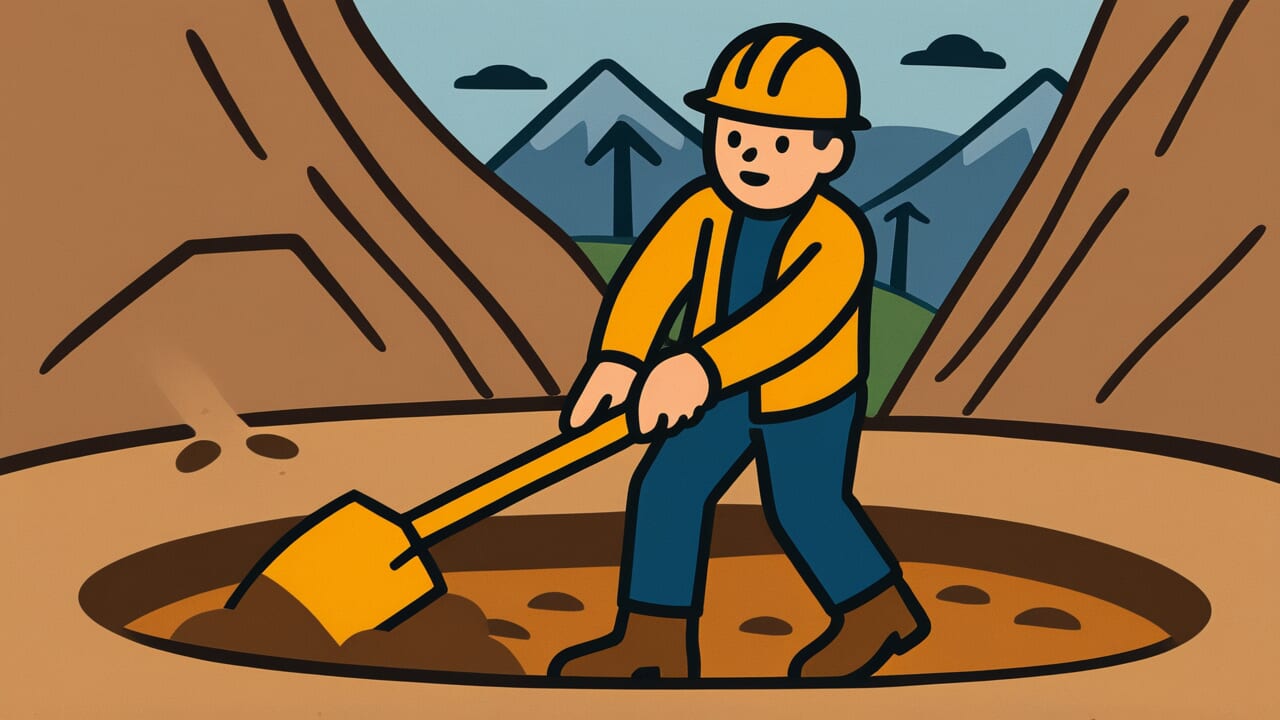How to Read “when you find yourself in a hole, the first thing to do is stop digging”
When you find yourself in a hole, the first thing to do is stop digging.
This saying uses everyday words that are easy to pronounce. The phrase flows naturally when spoken aloud.
Meaning of “when you find yourself in a hole, the first thing to do is stop digging”
Simply put, this proverb means when you’re in trouble, stop doing things that make the situation worse.
The saying uses the image of someone stuck in a hole. If you keep digging, the hole gets deeper. You become more trapped than before. The proverb takes this simple idea and applies it to life problems.
We use this wisdom when people keep making bad choices. Someone might be spending too much money while already in debt. A student might skip more classes after already failing tests. The saying reminds us that our first step should be stopping the harmful behavior.
What’s interesting about this wisdom is how obvious it sounds. Yet people often do the opposite when stressed or panicked. They repeat the same mistakes that got them in trouble. This proverb cuts through that confusion with a clear, memorable image.
Origin and Etymology
The exact origin of this saying is unknown, though it became popular in the 20th century. It appears to be American in origin. The phrase gained widespread use in business and political contexts.
During this era, folk wisdom often used simple, practical images. People understood the basic concept of digging holes from farm work and construction. The metaphor made sense to anyone who had used a shovel.
The saying spread through newspapers, speeches, and everyday conversation. It became particularly common in advice columns and self-help discussions. Politicians and business leaders adopted it to explain policy changes or strategic decisions.
Interesting Facts
The word “hole” comes from Old English meaning a hollow place or cavity. “Digging” derives from Middle English, related to the action of breaking up soil.
This proverb uses a perfect metaphor structure. It takes a physical action everyone understands and applies it to abstract problems. The image is so clear that translation into other languages preserves the meaning.
The saying demonstrates how modern proverbs often focus on stopping negative actions rather than starting positive ones. This reflects a problem-solving approach common in contemporary thinking.
Usage Examples
- Manager to employee: “I know the client is upset about the delayed project, but sending them angry emails defending our timeline will only make things worse – when you find yourself in a hole, the first thing to do is stop digging.”
- Friend to friend: “You’ve already apologized three times for forgetting her birthday, so stop bringing it up every conversation – when you find yourself in a hole, the first thing to do is stop digging.”
Universal Wisdom
This proverb reveals a fundamental truth about human psychology under stress. When people face problems, their natural instinct often pushes them toward more of the same behavior that created the trouble. This happens because familiar actions feel safer than unknown solutions, even when those actions are clearly harmful.
The wisdom addresses a core survival mechanism gone wrong. In dangerous situations, quick action often saves lives. But modern problems usually require the opposite response. Financial troubles, relationship conflicts, and work difficulties rarely improve through rushed decisions. Yet our brains still push us toward immediate action, even destructive action, because doing something feels better than doing nothing.
This creates a painful contradiction in human nature. We evolved to act quickly when threatened, but many modern threats require patience and restraint. The proverb captures this tension perfectly. It acknowledges that we will find ourselves in holes, but reminds us that panic-driven responses usually make everything worse. The deepest wisdom lies in recognizing that sometimes the most powerful action is stopping all action. This goes against every instinct, which is why the advice needs to be stated so clearly and memorably.
When AI Hears This
People create invisible layers of commitment with every action they take. Each shovel of dirt makes the hole deeper and harder to escape. The physical world changes around them, building walls that feel impossible to climb. Their own hands create the prison that traps them.
Humans mistake busy work for real progress in almost every situation. Moving feels better than standing still, even when movement goes nowhere. Action creates the illusion of control when everything feels chaotic. People would rather dig wrong than admit they need to stop.
This reveals something beautiful about human determination and stubborn hope. The same drive that traps people also builds cities and cures diseases. Humans refuse to give up, even when giving up makes sense. Their greatest weakness and their greatest strength are exactly the same thing.
Lessons for Today
Living with this wisdom requires developing the ability to pause when everything inside you wants to keep moving. The hardest part isn’t recognizing that you’re in a hole. Most people know when things are going badly. The challenge lies in resisting the urge to do something, anything, to feel like you’re fighting back against the problem.
This understanding transforms how we handle relationships and work situations. When conflicts arise, people often keep arguing the same points or making the same demands. The proverb suggests stepping back first. In group settings, this wisdom can prevent teams from doubling down on failed strategies. Someone needs to call for a pause before exploring new directions.
The broader lesson extends to how communities and organizations handle crises. The natural response to failure is often to do more of what isn’t working, just with greater intensity. This proverb offers a different path. It suggests that wisdom sometimes looks like inaction, that stopping can be more courageous than continuing. The goal isn’t to stay stuck forever, but to create space for better solutions to emerge. Real progress often begins with the discipline to stop making things worse.



Comments